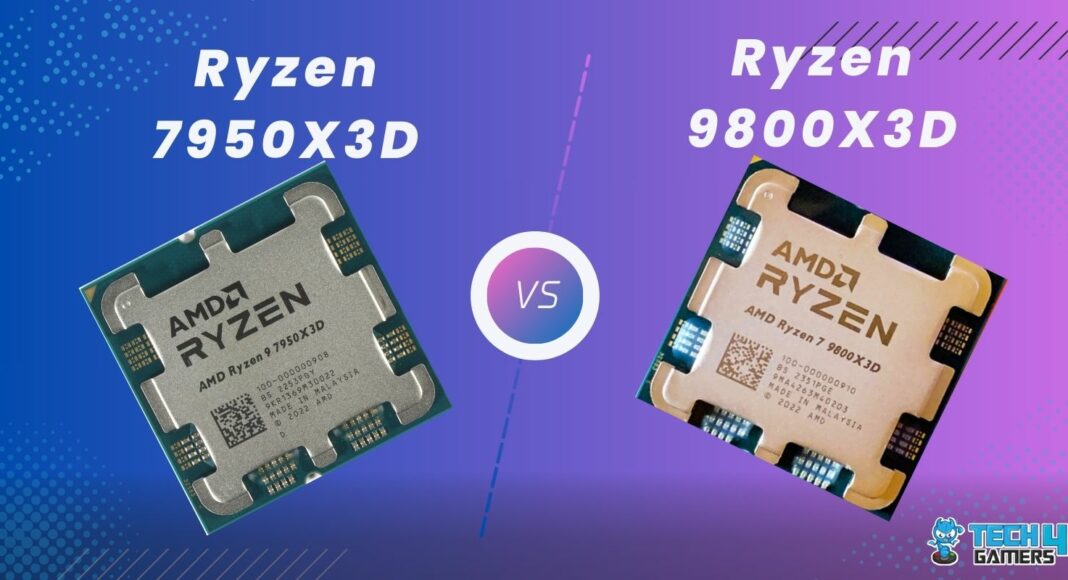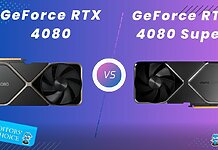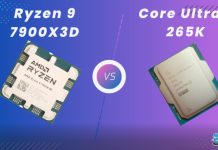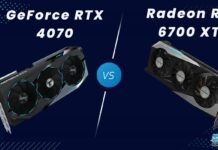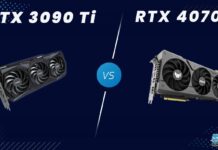AMD Ryzen 7 9800X3D Rated: 9/10 AMD Ryzen 9 7950X3D Rated: 9.3/10
Pros And Cons
| CPU | Pros | Cons |
|---|---|---|
| AMD Ryzen 7 9800X3D | ✅ Provides 96MB of L3 Cache ✅ Absolute option for overclocking | ❌ Less efficient in productivity tasks |
| AMD Ryzen 9 7950X3D | ✅ Equipped with 128MB L3 Cache ✅ Power Efficient | ❌ Inferior thermal efficiency |
Comparison Table
| Feature | AMD Ryzen 9 7950X3D | AMD Ryzen 7 9800X3D |
|---|---|---|
| No. of Cores | Total: 16 | Total: 8 |
| No. of Threads | 32 | 16 |
| Base Clock | 4.2GHz | 4.7GHz |
| Boost Clock | Max Turbo: Up to 5.7GHz | Max Turbo: Up to 5.2GHz |
| Integrated Graphics | AMD Radeon Graphics | AMD Radeon Graphics |
| Best Motherboard | Best Motherboards For R9 7950X3D | Best Motherboard For Ryzen 7 9800X3D |
| Best RAM | Best Ram For Ryzen 9 7950X3D | Best RAM For Ryzen 7 9800X3D |
| Best Cooler | Best Coolers For Ryzen 9 7950X3D | Best CPU Cooler For Ryzen 7 9800X3D |
| Processor Review | AMD Ryzen 7 9800X3D |
Architectural Differences
- Core Count: Starting off, the 7950X3D takes a comfortable lead by offering users 16 cores and 32 threads as compared to the 8 cores and 16 threads equipped on the 9800X3D.
- Clock Speed: While going over the clock speeds the 9800X3D offers a better base clock speed of 4.7GHz as compared to 4.2GHz. But the 7950X3D makes a comeback with a 5.7GHz boost clock speed when compared to the 5.2GHz offered by the latter.
- Cache: As for cache, the 9800X3D is equipped with 96MB of shared L3 cache, which easily gets outclassed by the 128MB available on the 7950X3D chip.
- Process Node: Moving on to the process node, the 9800X3D offers the more efficient 4nm process size while the 7950X3D comes with a slightly bigger 5nm process size.
- TDP: Although the processors differ in other categories, they both host a similar 120 TDP rating but due to the difference in technology one could be more power efficient than the other.
With the recent release of the X3D chips of the 9000 series by AMD, the market has been buzzing with the news of how well they are performing. But the real question is, can the 9800X3D beat the flagship model from the last gen? Let’s find out in our Ryzen 7 9800X3D Vs Ryzen 9 7950X3D comparison.
Gaming Benchmarks – 1080p
To kick things off, let’s start with the gaming benchmarks to test these chips at their limits we will be putting them through a number of games at 4K resolution to see how well they perform against each other on the same testing bench mentioned below.
Test Bench
- OS – Windows 11
- CPU Cooler – Enermax LiqMaxFlo 360mm
- Graphics Card – GIGABYTE RTX 4090 Gaming OC 24G
- SSD – XPG Gammix S50 Lite
- Power Supply – be quiet! Dark Power Pro 13 1300W
- Mobo (AMD) – ASRock X870E Taichi Lite
Star Wars Jedi: Survivor

- In Star Wars, the Ryzen 7 9800X3D averages 234 FPS, just slightly higher than the Ryzen 9 7950X3D’s 204 FPS. It’s a 13.6 % major edge, which adds a bit of extra fluidity to the gameplay.
- The 1% lows show a noticeable gap as well, with the 9800X3D hitting 206 FPS compared to the 7950X3D’s 184 FPS. This 11.2% advantage helps keep the action feeling steady, even during intense battles.
The Last of Us Part 1

- TLOU 1 runs smoother on the 9800X3D, reaching an average of 208 FPS versus 196 FPS on the 7950X3D. This 5.9% difference is small but impacts the overall experience.
- The 1% lows highlight the difference even more, with 155 FPS on the 9800X3D and just 129 FPS on the 7950X3D. That’s a substantial 18.3% difference, which helps avoid those annoying frame drops in crowded city scenes.
Cyberpunk 2077: Phantom Liberty

- In Cyberpunk, the 9800X3D averages 219 FPS, offering a nice 16.8% bump over the 7950X3D’s 185 FPS. This extra boost makes a noticeable difference in open-world exploration.
- The 9800X3D handles lows better here as well, with 148 FPS compared to the 7950X3D’s 136 FPS. That 8.4% lead smooths out the action and reduces stutter during intense fights.
Hogwarts Legacy

- Hogwarts Legacy runs at 170 FPS on the 9800X3D, while the 7950X3D manages 150 FPS. The 12.5% difference isn’t huge but provides a slightly better experience, especially in detailed town environments.
- The 9800X3D’s 1% lows come in at 148 FPS versus the 7950X3D’s 136 FPS. This 8.4% lead helps the 9800X3D feel more responsive, reducing stutters during action-packed moments.
Assetto Corsa Competizione

- With Assetto Corsa, the 9800X3D delivers 269 FPS on average, while the 7950X3D trails slightly at 185 FPS. This extra 16.8% power makes the races look smoother and more immersive.
- The difference in 1% lows is quite noticeable, with the 9800X3D at 223 FPS and the 7950X3D at just 185 FPS. That 18.6% advantage ensures fewer frame drops, keeping gameplay smooth in complex scenes.
Remnant II

- Remnant II shows a significant improvement on the 9800X3D, with an impressive 158 FPS compared to 137 FPS on the 7950X3D. That’s a huge 14.2% difference, making the game look stunningly smooth.
- The 9800X3D also performs better in 1% lows, hitting 122 FPS compared to 119 FPS on the 7950X3D. This 2.4% difference helps keep things consistent, even during intense action sequences.
Productivity Benchmarks
Now that we have covered the gaming benchmarks, let’s switch the landscape a little and see how well these chips perform when it comes to synthetic environments:
Cinebench R24

- In single-core performance in Cinebench 24, the Ryzen 7 9800X3D scores 133, slightly ahead of the Ryzen 9 7950X3D’s 122. That 8.6% difference adds a slight edge in single-threaded tasks.
- The Ryzen 9 7950X3D takes the lead here, scoring 2108 versus the 9800X3D’s 1318. This 46.1% difference shows a clear advantage in multi-core tasks.
Geekbench 6

- In Geekbench’s single-core test, the 9800X3D scores 3307, which is about 12.8% higher than the 7950X3D’s 2908. This gives the 9800X3D a slight edge in single-threaded performance.
- The 7950X3D scores 19481 in multi-core performance, surpassing the 9800X3D’s 18223 by about 6.6%. It’s not a huge gap, but it does show the 7950X3D’s multi-threading advantage.
iGPU – FP32 Performance

- For tasks that rely on the iGPU’s FP32 capabilities, like basic graphic rendering or computation, there’s no advantage between these processors; they deliver the same level of performance.
Overall Performance
Average Framerate
Both processors were seen to show remarkable gaming performance but the 9800X3D took a clear lead of 12.7% over the 7950X3D. During my testing, Moreover, during my testing, I never saw the latter taking any lead over the 9800X3D which proves its dominance in this sector.
1% Lows
The 1% lows also pained a similar picture with the 9800X3D maintaining on average a comfortable 22.9% lead over the 7950X3D. With the gap even increasing to 12.5% lead in games like Red Dead Redemption 2.
Productivity
On the other hand, the productivity charts mostly painted a different picture with the 7950X3D utilizing its higher core and thread count to maintain its lead over the 9800X3D since it was ahead in most of the tests.
Thermal Efficiency
| Feature | Ryzen 9 7950X3D (°C) | Ryzen 7 9800X3D (°C) |
|---|---|---|
| Average Thermal Statistics | 71.8🌡️ | 78.5🌡️ |
| Winner: AMD Ryzen 9 7950X3D | ||
While testing the thermal efficiency during gaming, I found the 7950X3D to run a little cooler compared to the 9800X3D. It kept a small lead of 8.8% on average across the games that were benchmarked.
Price
| CPU | Ryzen 9 7950X3D | Ryzen 7 9800X3D | Price Difference |
|---|---|---|---|
| Launch MSRP | 💲699 | 💲479 | 37.3% |
| Current Price | 💲597 | 💲479 | 21.9% |
On the pricing front, the 9800X3D takes the cake, as it offers a 21.9% lower price compared to the 7950X3D. But since it is still new to the market, it may start to face shortage issues which can hike the prices in no time.
What We Recommend
AMD Ryzen 9 7950X3D: If you are in the market looking for a CPU that helps you in your productivity tasks then the 7950X3D is a good choice. But the users need to decide whether the price point is worth getting it for at the moment when there are better options available.
AMD Ryzen 7 9800X3D: The 9800X3D is an absolute beast when it comes to gaming performance, the chip offers a massive advantage in games at a decent price tag which makes it tempting for a lot of gamers who are in the market looking for a good CPU.
Overall, both the chips have their good and bad while one offers great productivity it comes at a higher price tag. Meanwhile the other performs well in gaming, but it slightly falls behind in productivity. So the final decision rests on the needs of the end user.
Yes, both support overclocking, but the 9800X3D’s 3D V-Cache may limit frequency scaling. Both perform best with DDR5 memory, especially high-speed, low-latency kits. Yes, both are powerful enough to handle future games and applications for a good few years. Yes both CPUs offer integrated graphics for users in case they want to run the system without a dedicated GPU. The 3D V-Cache boosts gaming performance, especially in CPU-bound games. FAQs
More From Ryzen 7 9800X3D More From Ryzen 9 7950X3D
Thank you! Please share your positive feedback. 🔋
How could we improve this post? Please Help us. 😔
[Comparisons Expert]
Shehryar Khan, a seasoned PC hardware expert, brings over three years of extensive experience and a deep passion for the world of technology. With a love for building PCs and a genuine enthusiasm for exploring the latest advancements in components, his expertise shines through his work and dedication towards this field. Currently, Shehryar is rocking a custom loop setup for his built.
Get In Touch: shehryar@tech4gamers.com


